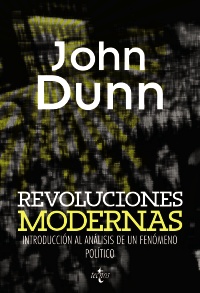
How to understand what are the revolutions, why they occur despite all of this, what will be its likely route and where and when will take place.
Revolutions modern is an interesting study written at the beginning of the 1970s, with the immediate purpose of serving as a basis for the academic monographs that those years taught by John Dunn King’s College Cambridge. Conceived from a double perspective, both theoretical and empirical, the essay aims to build a concept of revolution that is recognizable and applicable to the world of political phenomena real.
After tracing the features of some of the assumptions constitutive which give density to the conceptual term “revolution,” Dunn strives to study from these premises, the reality of various models of states that, at that time, were self-proclaimed revolutionaries, in their origins and in their subsequent development.
Much of this work is composed by case studies historic, but against what may seem, this is not a history book, but a study of political theory constructed from a key concept for the modernity, “the revolution”, which is discussed temporarily in the belief that time is the only course legitimate to understand truthfully the political events of the human beings. The book of John Dunn is in intention a work of political theory and as such is more exploratory than conclusive in all aspects.
The Spanish translation of 2013 includes a foreword especially written by the author for the occasion that shows that the study has not lost its relevance in both have not lost also, the categories and concepts that emerged from the political modernity illustrated.
This is not a history book, but a study of political theory constructed from a key concept for the modernity, “the revolution”.
.
Index
- Introduction to the Spanish edition.
- Update for the Spanish edition.
- Preface to the first English edition.
- Preface to the second English edition.
- Introduction.
- CAP. 1. Russia.
- CAP. 2. Mexico.
- CAP. 3. China.
- CAP. 4. Yugoslavia.
- CAP. 5. Vietnam.
- CAP. 6. Algeria.
- CAP. 7. Turkey.
- CAP. 8. Cuba.
- Conclusion.
- Bibliography.
- Additional readings, 1971-88.
.
Brief review on John Dunn

John Dunn is professor emeritus, King’s College, Cambridge, where he has discoursed almost the entirety of his academic career. Next to Guentin Skinner, is part of the second generation of the so-called “Cambridge school”, forged by the teachings of Peter Laslett and his invaluable studies of contextualization of the works of Filmer and John Locke (see preliminary study to the Second treatise on Civil Government Locke, classic, thought no. 28).
Specifically John Dunn was author in 1968 of an important study on the thought of John Locke, translated into several languages, as well as, together with Ian Harris, of an essential anthology of studies on the thought of the most important political thinkers. Other topics of interest to Dunn have been the nation of political obligation, the liability policy and in particular the problems and challenges of democracy. In 1995 was published in Spanish Democracy, the journey unfinished.
Exclusively dedicated to teaching and research, John Dunn is a master of thought and of the political right, an inevitable point of reference in the contemporary debate, in whose prolific academic career have come to meet many of the great intellectuals of our time, from Moses Finley to Tonny Jud or Ricard Tuck.
